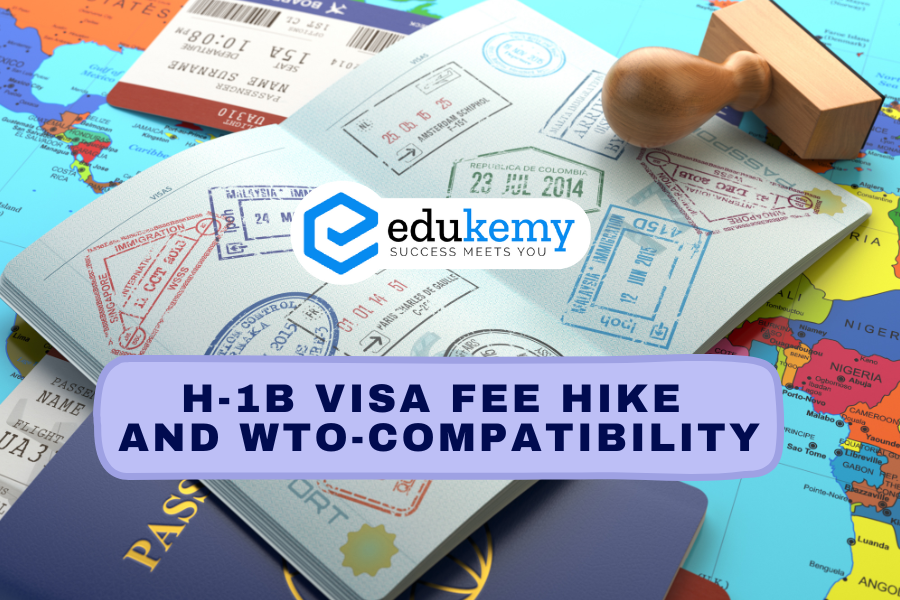
The H-1B visa is a non-immigrant visa category in the United States that allows U.S. employers to temporarily employ foreign workers in specialty occupations. This visa category has been significant for Indian software professionals, who have been major beneficiaries of the program.
Changes in H-1B Visa Rules: The United States implemented changes in the rules governing H-1B visas, including a fee hike for L1 visas (used for intra-company transfers) and H-1B working visas. Additionally, restrictions were placed on the number of visas awarded.
Indian Response – WTO Complaint: India, perceiving that these changes adversely affected its interests, lodged a complaint against the United States at the World Trade Organization (WTO). The complaint alleges that the U.S. violated its obligations under the General Agreement on Trade in Services (GATS).
Violation of Most-Favored-Nation Treatment: India’s argument revolves around the principle of Most-Favored-Nation (MFN) treatment under GATS. The core of MFN treatment is the requirement for equal treatment of all World Trade Organization (WTO) members. India contends that the fee increase imposed by the United States is not in compliance with this principle.
WTO Compatibility Analysis:
- GATS Obligations:
- The General Agreement on Trade in Services (GATS) sets out the framework for the multilateral trading system in services. Members are expected to adhere to the principles of non-discrimination, including MFN treatment.
- Equal Treatment Mandate:
- The concept of Most-Favored-Nation treatment requires that any advantage, favor, privilege, or immunity granted to one WTO member must be extended to all members.
- India’s Allegation:
- India argues that the fee hike and visa restrictions imposed by the U.S. violate the principle of MFN treatment by not extending equal benefits to all WTO members.
- WTO Adjudication:
- The WTO dispute settlement process involves consultations between the parties. If a resolution is not reached, the matter may proceed to a panel and, if necessary, to the Appellate Body.
Key Points:
- India’s complaint reflects a contention that the U.S. measures are inconsistent with WTO obligations, particularly in the context of services trade.
- The dispute highlights the ongoing challenges in balancing domestic policy decisions with international trade commitments.
Conclusion: The H-1B visa fee hike dispute at the WTO underscores the complexities involved when national immigration policies intersect with international trade agreements. The resolution of such disputes within the WTO framework will depend on interpretations of GATS principles and adherence to the commitments made by WTO members.
FAQs
1. What is the H-1B visa fee hike?
The H-1B visa fee hike refers to an increase in the government fees associated with applying for or sponsoring an H-1B visa. This visa allows US companies to employ foreign workers in specialty occupations.
2. How could the fee hike impact WTO compatibility?
The World Trade Organization (WTO) agreements aim to prevent discriminatory practices in international trade. An H-1B visa fee hike could be challenged if it unfairly disadvantages foreign companies compared to US companies when hiring foreign workers.
3. What are the arguments for and against WTO compatibility?
- Arguments for incompatibility: Some argue the fee hike disproportionately burdens companies hiring foreign workers, potentially violating WTO principles of non-discrimination.
- Arguments for compatibility: Others argue the fees cover processing costs and deter frivolous applications, not specifically targeting foreign companies.
4. Has there been a WTO challenge to an H-1B fee hike before?
There haven’t been any successful WTO challenges to previous H-1B fee hikes. However, the specific details of the current or future hikes could influence the possibility of a challenge.
5. Where can I find more information?
- US Citizenship and Immigration Services (USCIS) on H-1B visas: https://www.uscis.gov/
- World Trade Organization (WTO): https://www.wto.org/
In case you still have your doubts, contact us on 9811333901.
For UPSC Prelims Resources, Click here
For Daily Updates and Study Material:
Join our Telegram Channel – Edukemy for IAS
- 1. Learn through Videos – here
- 2. Be Exam Ready by Practicing Daily MCQs – here
- 3. Daily Newsletter – Get all your Current Affairs Covered – here
- 4. Mains Answer Writing Practice – here

